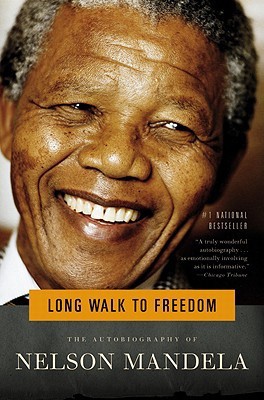Difference between revisions of "Long Walk to Freedom"
(Created page with "Long Walk to Freedom was firstly published in 1994. The book was written by Nelson Mandela. The book is explaining how Nelson Mandela who grows from a little kid born in Xhosa...") |
|||
| Line 15: | Line 15: | ||
[[Category: Anti-Black Racism in Nonfiction Books]] | [[Category: Anti-Black Racism in Nonfiction Books]] | ||
| − | [[Category: Black Racism in Nonfiction Books]] | + | [[Category: Black-Targeted Racism in Nonfiction Books]] |
Latest revision as of 07:35, 15 March 2021
Long Walk to Freedom was firstly published in 1994. The book was written by Nelson Mandela. The book is explaining how Nelson Mandela who grows from a little kid born in Xhosa to become the first black president of South Africa[1].
Plot

In South Africa, a bigoted law named “apartheid” was exceptionally well known in those days. It alluded to the segregation between individuals on the premise of their race and color. It was one of the foremost brutal social orders in which dark-skinned individuals were denied their civil rights. Nelson Mandela, a black civil rights activist from South Africa, was born within the Xhosa nation. After going through as a kid within the village, he moves to Johannesburg to get away from marriage. His passion for civil rights lead to a career in law, but Mandela's developing political thinking moved him to be more impactful, and he played a vital part in South Africa. In 1964 he was captured and sentenced to life imprisonment on charges of indicating to disrupt treason and violent scheme against the South African jurisdiction. Mandela spends twenty-seven years in imprisonment, most of them within the infamous jail on Robben Island. At last, within the breakthrough multi-racial decisions of April 1994, Mandela got to be South Africa's first-ever black President of South Africa[3].
Black Empowerment
He established a law firm for black South African to ask for their civil rights who are mostly in poverty and discriminated. He invited many black people to take part in fighting against racism. Although he did not use weapons and militant groups, his method has aspired many people in taking down structural racism. Mandela has shown that racism and discrimination such as apartheid chains can be removed from the government system. Mandela stood up against the government order and resist the temptation to change his idealism. Yet, he remained adamant with his belief in attaining the civil rights of black people even at the cost of his life. For that reason, when the government offered him parole by renouncing his ideas and methods, he rejected the offer blatantly in 1985. In the end, his goal in liberating the oppressed people from the oppressor had succeeded as the black South Africans have equal rights and freedom compared to the white South Africans[4].
Controversy
The National Party of South Africa established the apartheid laws oppressing and segregating the blacks of South African. The party restricted the black population and denied their civil rights. The apartheid also took houses of black people and replacing their owners with white folks while the blacks were banished from their area. They confined many political leaders of black people and put falsely accusation against civil rights activists. “Apartheid...represented the codification in one oppressive system of all the laws and regulations that had kept Africans in an inferior position to whites for centuries.” says Mandela. Mandela also included being arrested and banned from political activities. The government officials falsely accused Mandela and other 155 activists of high treason, terrorism, and destruction. While that, the police killed 69 black Africans and wounded 400 black people in Sharpeville, South Africa. Apartheid has caused many deaths, tragedies, and inflicted mental as Mandela would say "Apartheid created a deep and lasting wound in my country and my people. All of us will spend many years, if not generations, recovering from that profound hurt.[5].
References
- ↑ Long Walk to Freedom. Goodreads. Retrieved January 29 2021
- ↑ Long Walk To Freedom Book Cover Medium. Retrieved January 29 2021
- ↑ Book Review: Long Walk to Freedom - Nelson Mandela UPenn. Retrieved January 29 2021
- ↑ Matheus Guerra Costa. Long Walk To Freedom — Book Summary Medium. Retrieved January 29 2021
- ↑ Summary of Long Walk to Freedom GetAbstract. Retrieved January 29 2021